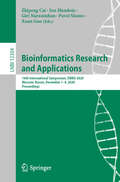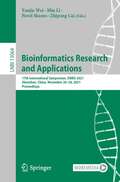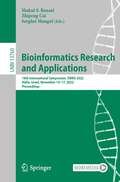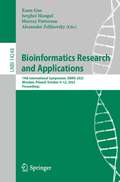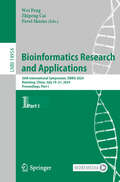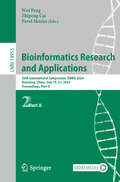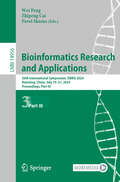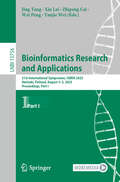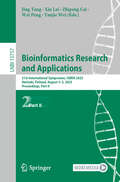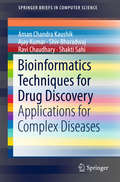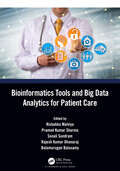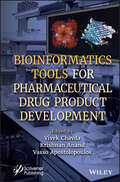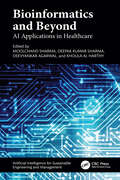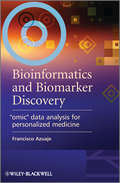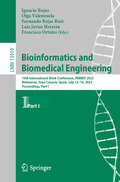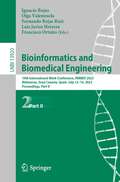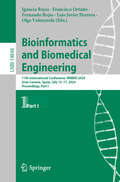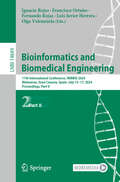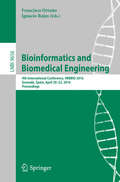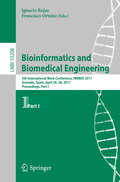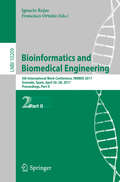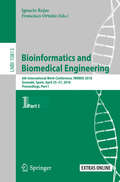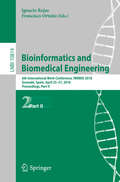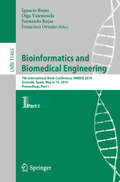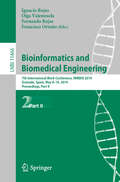- Table View
- List View
Bioinformatics Research and Applications: 16th International Symposium, ISBRA 2020, Moscow, Russia, December 1–4, 2020, Proceedings (Lecture Notes in Computer Science #12304)
by Xuan Guo Ion Mandoiu Pavel Skums Zhipeng Cai Giri NarasimhanThis book constitutes the proceedings of the 16th International Symposium on Bioinformatics Research and Applications, ISBRA 2020, held in Moscow, Russia, in December 2020. The 23 full papers and 18 short papers presented in this book were carefully reviewed and selected from 131 submissions. They were organized in topical sections named: genome analysis; systems biology; computational proteomics; machine and deep learning; and data analysis and methodology.
Bioinformatics Research and Applications: 17th International Symposium, ISBRA 2021, Shenzhen, China, November 26–28, 2021, Proceedings (Lecture Notes in Computer Science #13064)
by Min Li Pavel Skums Zhipeng Cai Yanjie WeiThis book constitutes the proceedings of the 17th International Symposium on Bioinformatics Research and Applications, ISBRA 2021, held in Shenzhen, China, in November 2021. The 51 full papers presented in this book were carefully reviewed and selected from 135 submissions. They were organized in topical sections named: AI and disease; computational proteomics; biomedical imaging; drug screening and drug-drug interaction prediction; Biomedical data; sequencing data analysis.
Bioinformatics Research and Applications: 18th International Symposium, ISBRA 2022, Haifa, Israel, November 14–17, 2022, Proceedings (Lecture Notes in Computer Science #13760)
by Zhipeng Cai Serghei Mangul Mukul S. BansalThis book constitutes the proceedings of the 18th International Symposium on Bioinformatics Research and Applications, ISBRA 2022, held in Haifa, Israel, in November 14–17, 2022.The 30 full papers and 4 short papers presented in this book were carefully reviewed and selected from 72 submissions. They were organized in topical sections named: AI and disease; computational proteomics; biomedical imaging; drug screening and drug-drug interaction prediction; Biomedical data; sequencing data analysis.
Bioinformatics Research and Applications: 19th International Symposium, ISBRA 2023, Wrocław, Poland, October 9–12, 2023, Proceedings (Lecture Notes in Computer Science #14248)
by Xuan Guo Alexander Zelikovsky Serghei Mangul Murray PattersonThis book constitutes the refereed proceedings of the 19th International Symposium on Bioinformatics Research and Applications, ISBRA 2023, held in Wrocław, Poland, during October 9–12, 2023.The 28 full papers and 16 short papers included in this book were carefully reviewed and selected from 89 submissions. They were organized in topical sections as follows: reconciling inconsistent molecular structures from biochemical databases; radiology report generation via visual recalibration and context gating-aware; sequence-based nanobody-antigen binding prediction; and hist2Vec: kernel-based embeddings for biological sequence classification.
Bioinformatics Research and Applications: 20th International Symposium, ISBRA 2024, Kunming, China, July 19–21, 2024, Proceedings, Part I (Lecture Notes in Computer Science #14954)
by Pavel Skums Zhipeng Cai Wei PengThis book constitutes the refereed proceedings of the 20th International Symposium on Bioinformatics Research and Applications, ISBRA 2024, held in Kunming, China, in July 19–21, 2024. The 93 full papers included in this book were carefully reviewed and selected from 236 submissions. The symposium provides a forum for the exchange of ideas and results among researchers, developers, and practitioners working on all aspects of bioinformatics and computational biology and their applications.
Bioinformatics Research and Applications: 20th International Symposium, ISBRA 2024, Kunming, China, July 19–21, 2024, Proceedings, Part II (Lecture Notes in Computer Science #14955)
by Pavel Skums Zhipeng Cai Wei PengThis book constitutes the refereed proceedings of the 20th International Symposium on Bioinformatics Research and Applications, ISBRA 2024, held in Kunming, China, in July 19–21, 2024. The 93 full papers included in this book were carefully reviewed and selected from 236 submissions. The symposium provides a forum for the exchange of ideas and results among researchers, developers, and practitioners working on all aspects of bioinformatics and computational biology and their applications.
Bioinformatics Research and Applications: 20th International Symposium, ISBRA 2024, Kunming, China, July 19–21, 2024, Proceedings, Part III (Lecture Notes in Computer Science #14956)
by Pavel Skums Zhipeng Cai Wei PengThis book constitutes the refereed proceedings of the 20th International Symposium on Bioinformatics Research and Applications, ISBRA 2024, held in Kunming, China, in July 19–21, 2024. The 93 full papers included in this book were carefully reviewed and selected from 236 submissions. The symposium provides a forum for the exchange of ideas and results among researchers, developers, and practitioners working on all aspects of bioinformatics and computational biology and their applications.
Bioinformatics Research and Applications: 21st International Symposium, ISBRA 2025, Helsinki, Finland, August 3–5, 2025, Proceedings, Part I (Lecture Notes in Computer Science #15756)
by Zhipeng Cai Wei Peng Xin Lai Yanjie Wei Jing TangThis two-set volume LNCS 15756 and 15767 constitutes the refereed proceedings of the 21st International Symposium on Bioinformatics Research and Applications, ISBRA 2025, held in Helsinki, Finland, during August 3–5, 2025. The 66 full papers were carefully reviewed and selected from 167 submissions. This year&’s symposium brought together leading researchers, scientists, and industry professionals from around the world to share cutting-edge advancements, foster collaboration, and explore the future of bioinformatics and computational biology.
Bioinformatics Research and Applications: 21st International Symposium, ISBRA 2025, Helsinki, Finland, August 3–5, 2025, Proceedings, Part II (Lecture Notes in Computer Science #15757)
by Zhipeng Cai Wei Peng Xin Lai Yanjie Wei Jing TangThis two-set volume LNCS 15756 and 15767 constitutes the refereed proceedings of the 21st International Symposium on Bioinformatics Research and Applications, ISBRA 2025, held in Helsinki, Finland, during August 3–5, 2025. The 66 full papers were carefully reviewed and selected from 167 submissions. This year&’s symposium brought together leading researchers, scientists, and industry professionals from around the world to share cutting-edge advancements, foster collaboration, and explore the future of bioinformatics and computational biology.
Bioinformatics Techniques for Drug Discovery: Applications For Complex Diseases (SpringerBriefs in Computer Science)
by Ajay Kumar Aman Chandra Kaushik Shiv Bharadwaj Ravi Chaudhary Shakti SahiThe application of bioinformatics approaches in drug design involves an interdisciplinary array of sophisticated techniques and software tools to elucidate hidden or complex biological data. This work reviews the latest bioinformatics approaches used for drug discovery. The text covers ligand-based and structure-based approaches for computer-aided drug design, 3D pharmacophore modeling, molecular dynamics simulation, the thermodynamics of ligand−receptor and ligand−enzyme association, thermodynamic characterization and optimization, and techniques for computational genomics and proteomics.
Bioinformatics Tools and Big Data Analytics for Patient Care
by Pramod Kumar Sharma Balamurugan Balusamy Rajesh Kumar Dhanaraj Rishabha Malviya Sonali SundramNowadays, raw biological data can be easily stored as databases in computers but extracting the required information is the real challenge for researchers. For this reason, bioinformatics tools perform a vital role in extracting and analyzing information from databases. Bioinformatics Tools and Big Data Analytics for Patient describes the applications of bioinformatics, data management, and computational techniques in clinical studies and drug discovery for patient care. The book gives details about the recent developments in the fields of artificial intelligence, cloud computing, and data analytics. It highlights the advances in computational techniques used to perform intelligent medical tasks. Features: • Presents recent developments in the fields of artificial intelligence, cloud computing, and data analytics for improved patient care. • Describes the applications of bioinformatics, data management, and computational techniques in clinical studies and drug discovery. • Summarizes several strategies, analyses, and optimization methods for patient healthcare. • Focuses on drug discovery and development by cloud computing and data-driven research. The targeted audience comprises academics, research scholars, healthcare professionals, hospital managers, pharmaceutical chemists, the biomedical industry, software engineers, and IT professionals.
Bioinformatics Tools for Pharmaceutical Drug Product Development
by Krishnan Anand Vivek Chavda Vasso ApostolopoulosBIOINFORMATICS TOOLS FOR Pharmaceutical DRUG PRODUCT DLEVELOPMENT A timely book that details bioinformatics tools, artificial intelligence, machine learning, computational methods, protein interactions, peptide-based drug design, and omics technologies, for drug development in the pharmaceutical and medical sciences industries. The book contains 17 chapters categorized into 3 sections. The first section presents the latest information on bioinformatics tools, artificial intelligence, machine learning, computational methods, protein interactions, peptide-based drug design, and omics technologies. The following 2 sections include bioinformatics tools for the pharmaceutical sector and the healthcare sector. Bioinformatics brings a new era in research to accelerate drug target and vaccine design development, improving validation approaches as well as facilitating and identifying side effects and predicting drug resistance. As such, this will aid in more successful drug candidates from discovery to clinical trials to the market, and most importantly make it a more cost-effective process overall. Readers will find in this book: Applications of bioinformatics tools for pharmaceutical drug product development like process development, pre-clinical development, clinical development, commercialization of the product, etc.; The ever-expanding application of this novel technology and discusses some of the unique challenges associated with such an approach; The broad and deep background, as well as updates, on recent advances in both medicine and AI/ML that enable the application of these cutting-edge bioinformatics tools. Audience The book will be used by researchers and scientists in academia and industry including drug developers, computational biochemists, bioinformaticians, immunologists, pharmaceutical and medical sciences, as well as those in artificial intelligence and machine learning.
Bioinformatics and Beyond: AI Applications in Healthcare (Artificial Intelligence for Sustainable Engineering and Management)
by Moolchand Sharma Deevyankar Agarwal Deepak Kumar Sharma Khoula Al HarthyThis book is a comprehensive exploration of the dynamic interplay between bioinformatics and artificial intelligence (AI) within the healthcare landscape. This book introduces readers to the foundational principles of bioinformatics and AI, elucidating their integration and collaborative potential.Bioinformatics and Beyond: AI Applications in Healthcare explores the transformative impact of data-driven insights, showcasing the applications of machine learning in diagnostics, personalized medicine, and genomic advancements. The book unveils the pivotal role AI plays in accelerating pharmaceutical research. Moreover, it addresses the practical implementation of AI in clinical decision support systems, while also critically examining challenges and ethical considerations associated with these technologies. Finally, the book looks toward the future, envisioning emerging trends and technologies that promise to reshape the future of healthcare. Aimed at professionals, researchers, and students across diverse disciplines, this book serves as an invaluable guide to understanding and navigating the evolving landscape of AI applications in healthcare.This book is tailored to meet the needs of scientists, researchers, practitioners, professionals, and educators actively engaged in the realms of bioinformatics, artificial intelligence, and healthcare. It will be an indispensable resource for those seeking advanced strategies to address challenges and harness opportunities in the rapidly evolving fields of medical and biomedical research.
Bioinformatics and Biomarker Discovery
by Francisco AzuajeThis book is designed to introduce biologists, clinicians and computational researchers to fundamental data analysis principles, techniques and tools for supporting the discovery of biomarkers and the implementation of diagnostic/prognostic systems.The focus of the book is on how fundamental statistical and data mining approaches can support biomarker discovery and evaluation, emphasising applications based on different types of "omic" data. The book also discusses design factors, requirements and techniques for disease screening, diagnostic and prognostic applications.Readers are provided with the knowledge needed to assess the requirements, computational approaches and outputs in disease biomarker research. Commentaries from guest experts are also included, containing detailed discussions of methodologies and applications based on specific types of "omic" data, as well as their integration. Covers the main range of data sources currently used for biomarker discoveryCovers the main range of data sources currently used for biomarker discoveryPuts emphasis on concepts, design principles and methodologies that can be extended or tailored to more specific applicationsOffers principles and methods for assessing the bioinformatic/biostatistic limitations, strengths and challenges in biomarker discovery studiesDiscusses systems biology approaches and applicationsIncludes expert chapter commentaries to further discuss relevance of techniques, summarize biological/clinical implications and provide alternative interpretations
Bioinformatics and Biomedical Engineering: 10th International Work-Conference, IWBBIO 2023, Meloneras, Gran Canaria, Spain, July 12–14, 2023, Proceedings, Part I (Lecture Notes in Computer Science #13919)
by Ignacio Rojas Francisco Ortuño Olga Valenzuela Luis Javier Herrera Fernando Rojas RuizThis volume constitutes the proceedings of the 10th International Work-Conference on IWBBIO 2023, held in Meloneras, Gran Canaria, Spain, during July 12-14, 2022. The total of 79 papers presented in the proceedings, was carefully reviewed and selected from 209 submissions. The papers cove the latest ideas and realizations in the foundations, theory, models, and applications for interdisciplinary and multidisciplinary research encompassing disciplines of computer science, mathematics, statistics, biology, bioinformatics, and biomedicine.
Bioinformatics and Biomedical Engineering: 10th International Work-Conference, IWBBIO 2023, Meloneras, Gran Canaria, Spain, July 12–14, 2023, Proceedings, Part II (Lecture Notes in Computer Science #13920)
by Ignacio Rojas Francisco Ortuño Olga Valenzuela Luis Javier Herrera Fernando Rojas RuizThis volume constitutes the proceedings of the 10th International Work-Conference on IWBBIO 2023, held in Meloneras, Gran Canaria, Spain, during July 12-14, 2022. The total of 79 papers presented in the proceedings, was carefully reviewed and selected from 209 submissions. The papers cove the latest ideas and realizations in the foundations, theory, models, and applications for interdisciplinary and multidisciplinary research encompassing disciplines of computer science, mathematics, statistics, biology, bioinformatics, and biomedicine.
Bioinformatics and Biomedical Engineering: 11th International Conference, IWBBIO 2024, Meloneras, Gran Canaria, Spain, July 15–17, 2024, Proceedings, Part I (Lecture Notes in Computer Science #14848)
by Ignacio Rojas Francisco Ortuño Olga Valenzuela Fernando Rojas Luis Javier HerreraThis volume constitutes the proceedings of the 11th International Work-Conference on IWBBIO 2023, held in Gran Canaria, Spain, during July 15-17, 2022. The 54 full papers were carefully reviewed and selected from 148 submissions. They were organized in the following topical sections: Biomarker Identification, Biomedical Engineering, Biomedical Signal Analysis, E-Health.
Bioinformatics and Biomedical Engineering: 11th International Conference, IWBBIO 2024, Meloneras, Gran Canaria, Spain, July 15–17, 2024, Proceedings, Part II (Lecture Notes in Computer Science #14849)
by Ignacio Rojas Francisco Ortuño Olga Valenzuela Fernando Rojas Luis Javier HerreraThis volume constitutes the proceedings of the 11th International Work-Conference on IWBBIO 2023, held in Meloneras, Gran Canaria, Spain, during July 15-17, 2022. The 54 full papers were carefully reviewed and selected from 148 submissions. They were organized in the following topical sections: Healthcare and Diseases, Machine Learning in Bioinformatics, New Advances in Deep Learning in Bioinformatics and Biomedicine, Novel Methodologies and Applications in Bioinformatics and Biomedicine.
Bioinformatics and Biomedical Engineering: 4th International Conference, IWBBIO 2016, Granada, Spain, April 20-22, 2016, Proceedings (Lecture Notes in Computer Science #9656)
by Ignacio Rojas Francisco OrtuñoThis book constitutes the refereed proceedings of the 4th International Conference on Bioinformatics and Biomedical Engineering, IWBBIO 2016, held in Granada, Spain, in April 2016. The 69 papers presented were carefully reviewed and selected from 286 submissions. The scope of the conference spans the following areas: bioinformatics for healthcare and diseases; biomedical image analysis; biomedical signal analysis; computational systems for modeling biological processes; eHealth; tools for next generation sequencing data analysis; assistive technology for people with neuromotor disorders; fundamentals of biological dynamics and maximization of the information extraction from the experiments in the biological systems; high performance computing in bioinformatics, computational biology and computational chemistry; human behavior monitoring, analysis and understanding; pattern recognition and machine learning in the -omics sciences; and resources for bioinformatics.
Bioinformatics and Biomedical Engineering: 5th International Work-Conference, IWBBIO 2017, Granada, Spain, April 26–28, 2017, Proceedings, Part I (Lecture Notes in Computer Science #10208)
by Ignacio Rojas and Francisco OrtuñoThis two volume set LNBI 10208 and LNBI 10209 constitutes the proceedings of the 5th International Work-Conference on Bioinformatics and Biomedical Engineering, IWBBIO 2017, held in Granada, Spain, in April 2017. The 122 papers presented were carefully reviewed and selected from 309 submissions. The scope of the conference spans the following areas: advances in computational intelligence for critical care; bioinformatics for healthcare and diseases; biomedical engineering; biomedical image analysis; biomedical signal analysis; biomedicine; challenges representing large-scale biological data; computational genomics; computational proteomics; computational systems for modeling biological processes; data driven biology - new tools, techniques and resources; eHealth; high-throughput bioinformatic tools for genomics; oncological big data and new mathematical tools; smart sensor and sensor-network architectures; time lapse experiments and multivariate biostatistics.
Bioinformatics and Biomedical Engineering: 5th International Work-Conference, IWBBIO 2017, Granada, Spain, April 26–28, 2017, Proceedings, Part II (Lecture Notes in Computer Science #10209)
by Ignacio Rojas and Francisco OrtuñoThis two volume set LNBI 10208 and LNBI 10209 constitutes the proceedings of the 5th International Work-Conference on Bioinformatics and Biomedical Engineering, IWBBIO 2017, held in Granada, Spain, in April 2017. The 122 papers presented were carefully reviewed and selected from 309 submissions. The scope of the conference spans the following areas: advances in computational intelligence for critical care; bioinformatics for healthcare and diseases; biomedical engineering; biomedical image analysis; biomedical signal analysis; biomedicine; challenges representing large-scale biological data; computational genomics; computational proteomics; computational systems for modeling biological processes; data driven biology - new tools, techniques and resources; eHealth; high-throughput bioinformatic tools for genomics; oncological big data and new mathematical tools; smart sensor and sensor-network architectures; time lapse experiments and multivariate biostatistics.
Bioinformatics and Biomedical Engineering: 6th International Work-Conference, IWBBIO 2018, Granada, Spain, April 25–27, 2018, Proceedings, Part I (Lecture Notes in Computer Science #10813)
by Ignacio Rojas Francisco OrtuñoThis two-volume set LNBI 10813 and LNBI 10814 constitutes the proceedings of the 6th International Work-Conference on Bioinformatics and Biomedical Engineering, IWBBIO 2018, held in Granada, Spain, in April 2018.The 88 regular papers presented were carefully reviewed and selected from 273 submissions. The scope of the conference spans the following areas: bioinformatics for healthcare and diseases; bioinformatics tools to integrate omics dataset and address biological question; challenges and advances in measurement and self-parametrization of complex biological systems; computational genomics; computational proteomics; computational systems for modelling biological processes; drug delivery system design aided by mathematical modelling and experiments; generation, management and biological insights from big data; high-throughput bioinformatic tools for medical genomics; next generation sequencing and sequence analysis; interpretable models in biomedicine and bioinformatics; little-big data. Reducing the complexity and facing uncertainty of highly underdetermined phenotype prediction problems; biomedical engineering; biomedical image analysis; biomedical signal analysis; challenges in smart and wearable sensor design for mobile health; and healthcare and diseases.
Bioinformatics and Biomedical Engineering: 6th International Work-Conference, IWBBIO 2018, Granada, Spain, April 25–27, 2018, Proceedings, Part II (Lecture Notes in Computer Science #10814)
by Ignacio Rojas Francisco OrtuñoThis two volume set LNBI 10813 and LNBI 10814 constitutes the proceedings of the 6th International Work-Conference on Bioinformatics and Biomedical Engineering, IWBBIO 2018, held in Granada, Spain, in April 2018.The 88 regular papers presented were carefully reviewed and selected from 273 submissions. The scope of the conference spans the following areas: bioinformatics for healthcare and diseases; bioinformatics tools to integrate omics dataset and address biological question; challenges and advances in measurement and self-parametrization of complex biological systems; computational genomics; computational proteomics; computational systems for modelling biological processes; drug delivery system design aided by mathematical modelling and experiments; generation, management and biological insights from big data; high-throughput bioinformatic tools for medical genomics; next generation sequencing and sequence analysis; interpretable models in biomedicine and bioinformatics; little-big data. Reducing the complexity and facing uncertainty of highly underdetermined phenotype prediction problems; biomedical engineering; biomedical image analysis; biomedical signal analysis; challenges in smart and wearable sensor design for mobile health; and healthcare and diseases.
Bioinformatics and Biomedical Engineering: 7th International Work-Conference, IWBBIO 2019, Granada, Spain, May 8-10, 2019, Proceedings, Part I (Lecture Notes in Computer Science #11465)
by Ignacio Rojas Francisco Ortuño Olga Valenzuela Fernando RojasThe two-volume set LNBI 11465 and LNBI 11466 constitutes the proceedings of the 7th International Work-Conference on Bioinformatics and Biomedical Engineering, IWBBIO 2019, held in Granada, Spain, in May 2019. The total of 97 papers presented in the proceedings, was carefully reviewed and selected from 301 submissions. The papers are organized in topical sections as follows: Part I: High-throughput genomics: bioinformatics tools and medical applications; omics data acquisition, processing, and analysis; bioinformatics approaches for analyzing cancer sequencing data; next generation sequencing and sequence analysis; structural bioinformatics and function; telemedicine for smart homes and remote monitoring; clustering and analysis of biological sequences with optimization algorithms; and computational approaches for drug repurposing and personalized medicine. Part II: Bioinformatics for healthcare and diseases; computational genomics/proteomics; computational systems for modelling biological processes; biomedical engineering; biomedical image analysis; and biomedicine and e-health.
Bioinformatics and Biomedical Engineering: 7th International Work-Conference, IWBBIO 2019, Granada, Spain, May 8-10, 2019, Proceedings, Part II (Lecture Notes in Computer Science #11466)
by Ignacio Rojas Francisco Ortuño Olga Valenzuela Fernando RojasThe two-volume set LNBI 11465 and LNBI 11466 constitutes the proceedings of the 7th International Work-Conference on Bioinformatics and Biomedical Engineering, IWBBIO 2019, held in Granada, Spain, in May 2019. The total of 97 papers presented in the proceedings, was carefully reviewed and selected from 301 submissions. The papers are organized in topical sections as follows: Part I: High-throughput genomics: bioinformatics tools and medical applications; omics data acquisition, processing, and analysis; bioinformatics approaches for analyzing cancer sequencing data; next generation sequencing and sequence analysis; structural bioinformatics and function; telemedicine for smart homes and remote monitoring; clustering and analysis of biological sequences with optimization algorithms; and computational approaches for drug repurposing and personalized medicine. Part II: Bioinformatics for healthcare and diseases; computational genomics/proteomics; computational systems for modelling biological processes; biomedical engineering; biomedical image analysis; and biomedicine and e-health.
